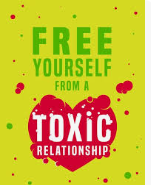By Patrick Cahillane – Life, Executive & Business Coach and Founder of The One Source Personal Development Network

Toxic relationships can take many different forms, but they all have one thing in common: they leave you feeling drained, unhappy, and sometimes even damaged. Whether it’s a romantic partner, a family member, or a friend, a toxic relationship can have a profound impact on your mental and emotional well-being. In this blog post, we’ll explore how to identify toxic relationships, how to end them, and how to heal from their impact.
What is a toxic relationship?
A toxic relationship is one in which the dynamic is unhealthy and detrimental to your well-being. There are many different signs that a relationship is toxic, but some common ones include:
- Constant criticism or belittling
- Manipulation or control
- Lack of respect for boundaries
- Gaslighting (making you doubt your own perceptions or experiences)
- Emotional or physical abuse
- Jealousy or possessiveness
- Inconsistency or unpredictability
- Lack of support or validation
If you’re in a toxic relationship, you may feel like you’re walking on eggshells or that you’re always trying to please the other person. You may feel like your needs and wants are constantly being ignored, and that you’re always sacrificing your own happiness for the sake of the relationship. Over time, this can lead to anxiety, depression, low self-esteem, and a host of other negative emotions.
How to end a toxic relationship
Ending a toxic relationship can be difficult, especially if you’ve been in it for a long time. However, it’s important to remember that your well-being is the most important thing, and that staying in a toxic relationship will only continue to harm you. Here are some steps you can take to end a toxic relationship:
- Identify the toxic patterns: Before you can end the relationship, you need to be clear about what makes it toxic. Write down the behaviors or dynamics that are harmful to you and how they make you feel.
- Set boundaries: Once you know what’s toxic, you can start setting boundaries to protect yourself. Be clear about what behaviors are not acceptable to you, and communicate them to the other person. If they continue to cross your boundaries, it may be time to end the relationship.
- Have a conversation: If you’re considering ending the relationship, it’s important to have an honest conversation with the other person. Be clear about why you’re ending things, but also be compassionate and empathetic. Remember that the other person may be hurt or upset, but that’s not your responsibility to fix.
- Take time to grieve: Ending a relationship, even a toxic one, can be painful. Allow yourself to grieve the loss, and don’t rush the healing process.
- Seek support: Surround yourself with friends and family who support you, and consider seeing a therapist to help you process your emotions.
How to heal from the impact of a toxic relationship
Even after you’ve ended a toxic relationship, the impact can linger. Here are some tips for healing from the effects of a toxic relationship:
- Practice self-care: Take care of yourself physically, emotionally, and spiritually. Eat well, exercise, get enough sleep, and do things that bring you joy.
- Learn to trust yourself again: If you’ve been in a toxic relationship, you may have lost touch with your own feelings and intuition. Spend time getting to know yourself again, and trust your instincts.
- Focus on healthy relationships: Surround yourself with people who are supportive, respectful, and kind. Build new relationships based on mutual respect and trust.
- Seek therapy: A therapist can help you work through the emotions and trauma that may have resulted from the toxic relationship. They can also help you develop healthy coping mechanisms and communication skills.
If you are in a toxic relationship and need support. Contact Us – We can help.
